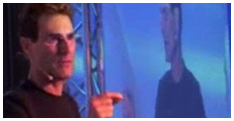A review of the unauthorized biography in New Statesman
New Statesman
27th November 1998
MARTYN BEDFORD
What a bender
URI GELLER: MAGICIAN OR MYSTIC?
Jonathan Margolis Orion Books, 296pp, £16.99
A funny thing didn’t happen to me on the way to this review. Three funny things, to be precise. I left a coin overnight on my bedside table to see if it would change position or flip from tails to heads – it didn’t. I placed a teaspoon over the dustjacket photo of Uri Geller in the hope that it would bend- it didn’t. And I followed the DIY guide to spoon bending on page 261 without success. Now that’s weird. Weird because the journalist and celebrity writer Jonathan Margolis was plagued by bizarre incidents while writing this appraisal of the Geller phenomenon. Crashed computers, broken clocks, telepathic wake-up calls, camera malfunctions, the destruction of two tape recorders … and by the end he was bending spoons himself as though they were made of Plasticine. A nice party piece, but scant consolation for the loss of so much expensive gadgetry.
So what does it prove, all this anecdotal paranormality? A lot, or a little, depending on our receptivity to second-hand evidence, this being one of Margolis’s themes: the extent to which belief or disbelief in apparently irrational events relies on hard, scientific, rational proof. In Uri Geller he has the perfect subject. After three decades of international fame, close scrutiny in front of the world’s television cameras, countless claims affirming or refuting his psychic capability, and despite tests under laboratory conditions, lay people and experts alike remain divided on whether or not the man is a fake. Geller is a bit like God, you either believe in him or you don’t.
Margolis began this book as a sceptic. Indeed, this is as much a work of investigative journalism as it is of biography, although he is adept at mapping out Geller’s fascinating path from childhood in Israel and Cyprus to a superstar lifestyle in the US and Britain, as well as undercover work for the CIA and Mossad.
It was an encounter with a mysterious bright light in a garden in Tel Aviv which, Geller believes, gave him his paranormal powers. He started with feats for friends and family – altering watches without touching them and, of course, the stuff with the Cutlery – before developing more sophisticated powers such as telepathy, hypnotism, teleportation, dowsing and prescience. By his early twenties he had himself an act. Private parties at first, then professional shows. All the amazing wizardry of a stage magician, but with one crucial difference: he claims his “tricks” aren’t tricks at all; they are the real thing.
This claim irritates magicians. To them, illusionism is an honest deceit, the creation of a semblance of the supernatural through sleight of hand, audience misdirection and cunningly designed props. Uri Geller, they allege, is a charlatan. Several conjurors base their acts on replicating his demonstrations and one prominent Canadian magician, has obsessively attempted to expose him. Margolis gives space to this chorus of disapproval.
That this is such an even-handed and assiduously researched work is due, in part, to Geller himself. Having agreed to cooperate with what is in effect an authorised biography, he gave its author free rein to cull opinions and evidence across the spectrum. The result is something close to a definitive assessment. And Margolis’s verdict? Well, he is clearly impressed by the logically inexplicable Gellerisms he witnessed for himself, as well as those he unearthed during scores of interviews. Reading them, it is hard not to be won over. It may be that this man is the greatest illusionist of all time. Or that science is simply not yet able to account, rationally, for what he does. Or perhaps he is genuinely blessed with supernatural powers. Whichever of these is true, Margolis argues with some justification that Uri Geller is an exceptionally gifted and charismatic phenomenon. What a pity, then, that in terms of popular perception he is destined to go down in history as that bloke who bent spoons.
Martyn Bedford’s third novel, ” The Houdini Girl “, is about a magician. It is published by Viking in February


Latest Articles

Motivational Inspirational Speaker
Motivational, inspirational, empowering compelling 'infotainment' which leaves the audience amazed, mesmerized, motivated, enthusiastic, revitalised and with a much improved positive mental attitude, state of mind & self-belief.



















